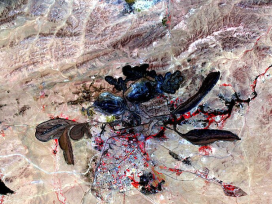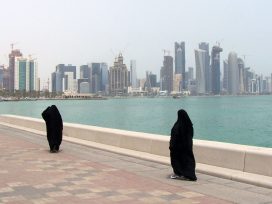The Chinese government’s fondest hope for 2008 is that the Olympic Games will pass off quietly. Top priority has been given to extinguishing the various incipient resistance activities and dissident voices before they have a chance to bud. Things are not going as hoped, however; incidents of resistance continue to occur, to the discomfort of the Chinese authorities. Farmers are fighting battles in defence of their land; urban residents are resisting demolition and forced relocations in towns and cities across the country; there are various movements for environmental rights; the survivors of the Anti-Rightist campaign are seeking compensation from the state; others are seeking a restoration of the reputation of former Communist Party General Secretary Zhao Ziyang, forced to step down in 1989. One or two intellectuals are even emerging, despite the authorities attempt to placate the intellegentsia in recent years: Guo Quan, a lecturer at Nanjing Normal University, wrote an open letter last November calling for democratic government and improvement in human rights. The authorities may have succeeded in confining the negative impact of this resistance within China, but the events that began to spread on 10 March with increasing intensity across Tibet and Tibetan areas of Gansu, Qinghai and Sichuan, and the subsequent firm crackdown by the authorities, have attracted strong international condemnation.
The resistance in Tibet may have drawn the most attention, but it is two other forms of social protest that have become nightmares the Chinese government is finding impossible to dispel.
The first is farmers fighting for ownership rights to the land. During the past ten years, more than 60 million peasants have lost their land. Prior to 2007, the main complaint was the level of compensation and the corruption of local officials during compulsory land purchases. From mid-2007, the peasants’ calls turned to demands for ownership rights to the land. The largest such incidents occurred in the area around the Sanmenxia reservoir along the Yellow River in Shaanxi and in Fujin in Heilongjiang province. Public opinion in China defined this series of incidents as “a war to protect the land”. It was during this bout of rural resistance that peasants deprived of their land in Fujin first used the slogan “land not Olympics”.
The second main force for resistance has been the environmental rights movement. China’s economic development over the past 30 years has come at the price of severe damage to the natural environment. How high exactly has that price been? Pan Yue, deputy director of the State Environmental Protection Administration (now the Ministry for Environmental Protection), has said publicly that pollution has meant the cost of development in China has been 7 per cent higher than the global average, and that economic losses due to pollution and environmental degradation are equivalent to 15 per cent of China’s GDP. China currently has 150 million environmental refugees (people displaced by environmental degradation). There has been a steep upward trend in disputes concerning pollution since 1997, with the number growing by 25 per cent year on year, surpassing a total 500,000 recorded incidents during 2003. Petitions (a system where citizens can in theory take local complaints direct to higher-level authorities) from rural residents show that 20 per cent concerned environmental pollution, making this the second most common type of complaint after compulsory land purchase.
In China, when a farmer loses her land she has lost her means of making a living, as there is nowhere for farmers to go if they leave the countryside. It is impossible for official agencies in charge of the economy to find work for such a mass of low-skilled labour other than in a few labour-intensive industries. The vaunted rapid growth of the economy has not provided employment opportunities for all members of society. The number of unemployed is close to 300 million, more and more of whom are recent university graduates. The low rewards of a brutal wage regime leave peasants practically unable to make a living away from the countryside.
Yet local government is at present heavily reliant on the land for its income and is the main culprit in the seizure of peasant land and the introduction of polluting industries. The Chinese government’s main measure for evaluating its officials’ performance is GDP growth rate (in the administrative division they govern). To keep funds flowing and to win the approval of their superiors, local governments are making a grab for the peasants’ arable land. Under Chinese law, urban land is owned by the state, but rural land is held by the collective. Such a system of land ownership means the Chinese government has the power to allocate the land, providing a systemic means for local governments to carry out their “enclosure movement”. The outcome is either that vast numbers of peasants become landless, unable to farm or to find work elsewhere and with nowhere else to go; or that those peasants who hold on to their land find the environment they depend on for their livelihood has been severely polluted. Statistics for the total value of land sales in China in the 2002-03 fiscal year put the amount at more than 910 billion yuan, equivalent to about 35 per cent of local government income for the period. In 2004, funds from land sales nationally accounted for 47 per cent of local government budgetary income. In 2005-06 such funds accounted for more than two-thirds of local government income. The sale of land is a budgetary lifeline for local government and more than 80 per cent of cases of official corruption involved land transactions. There is no prospect whatsoever of an end to this kind of land seizure.
The Chinese authorities have accumulated a wealth of experience when it comes to dealing with social resistance. From 2003 to 2006, recorded incidents rose from 58,000 annually to more than 80,000. The authorities are extremely vigilant regarding such acts of popular resistance and dissident activity. The Chinese Communist Party, promoter of the popular notion of class with its “class struggle doctrine”, knows from its own “revolutionary experience” that although the mass of disenfranchised at the lower rungs of the social ladder is vast, it at most amounts to a great heap of so many nothings, since it is in a disorganised state like Sun Yat-sen’s “tray of sand” (in his metaphor of Chinese society). Yet should someone, particularly someone educated, emerge to organise the peasants, so full of anger and with no hope of finding any succour from the present order, those nothings could well become something very major indeed. As a result, the Chinese authorities are adopting policies to preserve stability in the run-up to the Olympics.
There is severe punishment for any organised activity. Whenever any initial signs of organised resistance are seen, placatory measures are adopted to calm the situation; these are followed by the arrest and severe punishment of leaders and organisers. Last year, the Chinese government began arresting a number of peasant leaders, like Chen Sizhong, Xi Xinji and Zhang Sanmin who represented peasants deprived of their land in Sanmenxia and Yang Chunlin and others in Heilongjiang. Yet no measures have been taken to provide for peasants’ lost livelihoods. Guo Feixiong, the independent journalist and publisher who helped the villagers of Taishi in Guangdong defend their rights to the land in 2005, was punished severely by the authorities because they believed he had organised and set in motion resistance to the local government.
There is also a policy of controlling information. The Chinese authorities do not stop all reporting, particularly where coverage of overseas efforts to boycott the Olympics is concerned, but they ensure that what does emerge is distorted. For example, the Global Times, a subsidiary of the Xinhua News Agency, reported “foreign friends” of China as saying that the people behind the overseas boycott movement were nobodies hoping to use the Olympics to raise their profiles and get something for themselves. Not a word has been seen about the eight Nobel Peace Prize winners also joining calls for a boycott. The events in Tibet in March saw the Chinese authorities prevent any access by foreign journalists, in an attempt to shield themselves from the eyes of the world.
A third technique is the arrest of some dissidents who had been in contact with international rights organisations, as in the arrest last year of Reporters Sans Frontières award-winning journalist Hu Jia. In early March, rights lawyers Teng Biao, Li Heping and others were also threatened with detention and even traffic “accidents” to prevent them causing any trouble for the government during the Olympics.
Another method the authorities employ to preserve stability is that of “purifying” Beijing. The Chinese authorities have used the police to force petitioners who come to the capital from all around the country out of Beijing, ensuring the athletes and VIP guests attending the Games will not be troubled by any unpleasant sight from China’s darker side.
Yet looked at in terms of China’s overall social development, the opportunity the Olympics offers to disenfranchised and ethnic minority groups in places like Tibet and Xinjiang to air their grievances, is only a beginning. The high levels of political repression currently adopted by the authorities will not resolve the underlying conflicts: at best they will succeed in forcing resistance underground. The main reason for resistance is livelihood and survival, so there is no way back for those taking this path. In the next few years we can expect to see both resilient resistance from the lower strata of society and violent repression from the Chinese government become the main themes of the nation’s politics. Given this situation, the Chinese people must look to aid from the international community to press for further advances in human rights in China.






